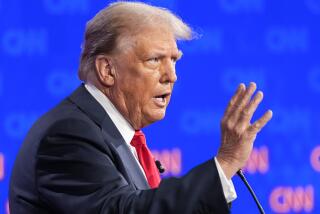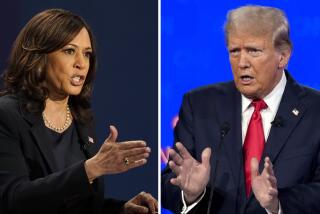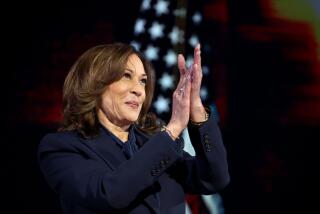McManus: Obama’s less-is-more agenda
President Obama’s State of the Union address Tuesday, the first of his second term, won’t be long remembered. It didn’t offer much in the way of new ideas. It was short on memorable lines — except, perhaps, his demand for congressional action on gun control because Gabby Giffords and the families of Newtown “deserve a vote.”
But those are all good things. They tell us that after four years in the White House and a hard-won reelection, Obama has recalibrated his ambitions to match the moment. A president who once promised to transform American politics and stop the oceans’ rise has downsized his goals, not because he wanted to but because circumstance has made it necessary.
A soaring speech full of ambitious new goals wouldn’t make sense in the Washington of 2013. Obama still faces a hostile Republican majority in the House and a forbidding deficit that limits the amount of money he can spend.
TRANSCRIPT: 2013 State of the Union
He’s already proposed two big new agenda items for his second term: immigration reform and gun control. (They’re actually old ideas, but it’s been so long since they were debated in Congress, they seem new again.) If the president makes real headway on them, and keeps the economy from stalling, his next two years at least will look like a success.
The main theme of the speech was jobs. (He’s for them.) But his economic proposals were relatively modest, and mostly recycled. Even the cover design for his economic plan was recycled from last year’s State of the Union handout.
It may have sounded as if Obama was calling for a massive array of new federal initiatives, but on closer inspection, they are mostly micro-initiatives.
He promised limited executive actions to reduce greenhouse gases, not the far-reaching legislation he once sought to stem climate change. He asked Congress to pass a law making it easier for homeowners to refinance their mortgages, but the idea faces long odds in the House. He called for a new infrastructure funding plan, but it was a downsized version of one he proposed in 2011.
Other ideas came with an even longer pedigree. The proposal to increase the minimum wage to $9? Downsized from the $9.50 proposal of the 2008 campaign. Universal preschool, without a mention of how it would be funded? Again, the 2008 campaign.
As one of the president’s aides told me: They were good ideas before; they’re good ideas now.
Especially the ones about jobs. “A growing economy that creates good middle-class jobs — that must be the North Star that guides our efforts,” he said.
Fair enough. But both parties see the same North Star; the problem is they insist on taking different paths to pursue it.
Obama didn’t solve that problem Tuesday. He exhorted Republicans (for the umpteenth time) to adopt his solution to the impending crisis over automatic spending cuts: closing tax loopholes that benefit “the well-off and well-connected.” In return, he offered to support modest reforms in Medicare, an offer he has also made before.
And, significantly, he contended that a modest amount of deficit reduction is all we need. In 2011 and 2012, the president spent weeks trying to strike an ambitious multitrillion-dollar “grand bargain” over taxes and spending with House Speaker John A. Boehner (R-Ohio). But on Tuesday, Obama whittled that down: another $1.5 trillion and we’re done. His downsized goals may be easier to reach, for Congress and himself. But deficit hawks are furious.
There was important foreign policy in the speech too, a sign that like most second-term presidents facing a difficult Congress, Obama is discovering the rewards of acting as diplomat in chief.
He promised to bring home half of the 66,000 U.S. troops in Afghanistan by next year, and the other half a year later. He called for a free-trade agreement with Europe, a goal that sounds boring but could turn out to be the most historic proposal in the speech. And he said he would work to negotiate new nuclear arms reductions with Russia, a measure that, not incidentally, could save real money.
Second terms are often disastrous, and they sometimes fall afoul of a president’s conviction that reelection gave him a mandate to do big things.
George W. Bush used the first State of the Union address of his second term to call for the partial privatization of Social Security; the collapse of that effort was an early sign that his presidency was in trouble. Bill Clinton opened his second term with ambitious goals for education and entitlement reforms that went nowhere. He spent much of his remaining tenure battling impeachment instead.
Obama has set more realistic targets. If he meets the most significant of them — immigration reform, even modest steps on gun control, an end to the U.S. combat role in Afghanistan, a free-trade agreement with Europe and, oh yes, implementation of Obamacare — and manages to keep the economy growing, even if slowly, that’s not a bad list. Plenty of two-term presidents have done worse.
Follow Doyle McManus on Twitter @DoyleMcManus
More to Read
A cure for the common opinion
Get thought-provoking perspectives with our weekly newsletter.
You may occasionally receive promotional content from the Los Angeles Times.











